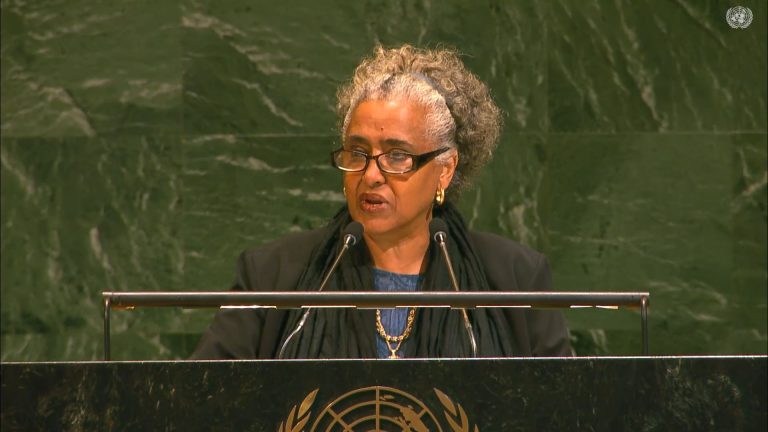Eritrea urges UN to declare December 4 international day against unilateral coercive measures

Eritrea has called on the United Nations General Assembly to formally recognize December 4 as the International Day Against Unilateral Coercive Measures, describing such sanctions as violations of international law that harm millions globally and undermine the UN Charter.
Delivering a powerful statement during the introduction of draft resolution A/79/L.93, Eritrea’s Permanent Representative to the UN, Ambassador Sophia Tesfamariam, addressed the Assembly on behalf of the Group of Friends in Defense of the Charter of the United Nations, a bloc of states co-sponsoring the initiative.
“Unilateral coercive measures, commonly cloaked in the misleading language of ‘sanctions’, are deployed not as instruments of justice — much less of legality — but as tools of political and economic compulsion,” said Tesfamariam.
She emphasized that these actions are taken outside the bounds of international law and directly contradict the founding principles of the United Nations, including sovereignty, self-determination, and peaceful coexistence.
The resolution, which carries no financial implications, seeks to designate December 4 — the anniversary of the Declaration on the Right to Development — as a day to reflect on the widespread impact of unilateral sanctions and to promote international solidarity and cooperation.
Citing data from UN reports, Tesfamariam highlighted that more than 30 countries — representing over one-third of the world’s population — currently suffer under such measures.
“These unlawful measures punish millions of people worldwide, blocking access to food, medicines, technology, and development; undermining entire societies; and violating fundamental human rights,” she noted.
The ambassador also criticized the extraterritorial nature of these sanctions, which she said disrupt global supply chains and obstruct lawful international trade.
“These measures undermine the very multilateral system we are gathered here to defend,” she added.
Tesfamariam stressed the inclusive and non-confrontational nature of the draft resolution, stating it was framed to encourage consensus, not division.
“This is a non-confrontational and forward-looking initiative. It seeks to foster reflection, solidarity, and global dialogue.”
Anticipating resistance, the ambassador acknowledged that some member states might oppose the resolution, dismissing it as merely symbolic.
However, she countered that “symbols matter.
They are the expressions of collective conscience, sympathy and understanding. They inspire action, sustain hope, and move history forward.”
Calling on all UN member states to vote in favor, she concluded, “Let this General Assembly send a united message, unequivocally reaffirming its opposition to unilateralism…
Let this body proclaim that illegality must not be normalized and that the voices of those affected… will not go unheard.”
If passed, the resolution would represent a significant diplomatic gesture against the use of sanctions outside the framework of the UN Security Council — a subject that has gained increased attention amid shifting geopolitical alliances and growing calls from the Global South for reform in the international order.
About The Author
dailymailafric
I am an avid African news observer, and an active member of Daily Mail Africa.
I’m Passionate about staying informed on diverse topics across the continent,
I actively contribute to publishing on political, economic and cultural developments in Africa.



